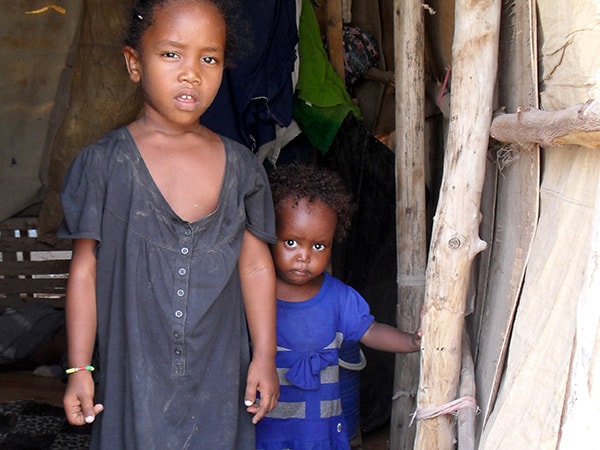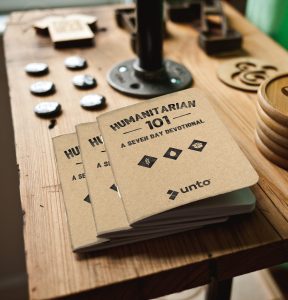Send Necessities to Suffering People
By Amanda DeWitt

Hurricane victims watch their homes wash away. Refugee families use makeshift tents to protect their children from rain, sun, and frigid temperatures. Individuals living in war zones wait in long lines just to receive a few basic supplies.
Every day millions of people worldwide face harrowing situations in which they lack simple items needed to survive. In fact even before the pandemic, over one billion people lived in countries affected by long-term humanitarian crises.
What is critical aid?
Critical aid describes a broad category of humanitarian supplies. It includes temporary shelters for victims of natural disasters and tarps for refugees and displaced people to make tents. It means clothing and blankets for children and their families as they endure dangerously cold temperatures.
Tarps are one of the most important types of critical aid.
Many people in dire circumstances use billboard materials to construct make-shift shelters — these materials are highly flammable and do not weather well. Tarps can be used for flooring, temporary shelter, and for additional covering over tents for longer-term protection from weather.
Critical aid also comes in the form of eyeglasses, providing sight to people who otherwise could not work or see the faces of their family members. It is medical supplies that protect frontline workers and patients and hygiene items for women and children. It also comes in the form of mobility aids for people living with disabilities and training for their caregivers.
All these necessary supplies provide basic care for impoverished or displaced people in the toughest places to help them build a better future.
What situations create a need for critical aid?
Millions of people around the world lack access to basic care. Poverty prevents families from being able to afford clothes, shoes, and blankets or being able to access healthcare items. These families also often lack proper education and training on hygiene and disease prevention. Many of these problems can be solved by providing critical humanitarian aid and training that educates on how disease spreads — especially relevant during the COVID-19 pandemic.
The refugee crisis has left an unprecedented 79.5 million people displaced from their homes. Many of these people live in camps with limited access to food, hygiene items, and other basic care. When refugees settle in a new country, they may not be permitted to work, which increases their need for humanitarian aid.
War creates major humanitarian crises in many parts of the world. Conflicts cut off supply chains and leave people unable to access the supplies they need. Homes are destroyed. People groups are isolated or displaced. Economies are devastated and jobs are wiped out.
Natural disasters also leave people in need of critical aid as entire towns may be devastated by hurricanes, storms, explosions, and other unexpected events. In these circumstances people need immediate shelter, power sources, hygiene items, and more to sustain life and survive.
How can you help?
With so much suffering in the world, it is easy to wonder what difference you can make. Many of the problems that make critical aid necessary are extremely complex and sometimes completely unavoidable (as with natural disasters).
But each of us can do something to help. You can relieve the suffering of one individual, restore the dignity of one child, and reveal the hope of Jesus to one family. Working together we can provide people with items like blankets, tarps, clothes, and hygiene supplies.
Here is just one example of how you can make a difference: Experts predict this could be one of the worst winters on record. With COVID-19 already blanketing the globe, the situation is only expected to worsen as cooler temperatures arrive.
That means even more people could face lockdowns and joblessness. Even more refugees, orphans, and suffering families could lack access to food, shelter, and healthcare.
You can help rush the lifesaving aid they need to survive the winter months in some of the toughest places on earth. For just $35 you can send a Winter Survival Kit packed with aid to people in dire need — items like meals, clothing, blankets, water filters, masks, and more.
We cannot end wars, poverty, or the refugee crisis. But we can each do something to help a refugee, orphan, or family in need. What will you do to relieve someone’s suffering today?
Want to learn more about being a humanitarian?
People around the world experience suffering, and we wonder how to help change that. But the Bible assures us that God is constantly at work, drawing people to Himself, not in spite of disaster, conflict, and poverty, but even in and through those situations. Our Humanitarian 101: A 7-Day Devotional journal offers seven devotionals designed to help you consider suffering and how you can make a difference.
Published November 17, 2020

Amanda is a freelance writer whose work has appeared in Gift for Leadership, Kindred Spirit, and Christianity Today publications. She holds a M.A. in Media and Communication from Dallas Theological Seminary.



